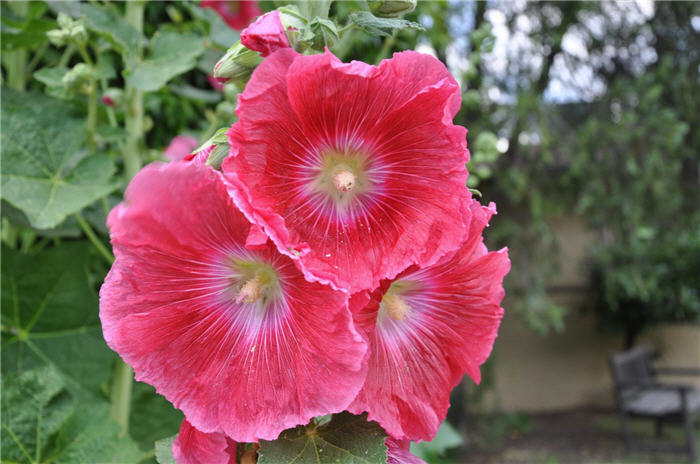| Botanical Name: Alcea rosea | |
| Common Name: Hollyhock |

-
Anatomy
-
Culture
-
Design
Plant Type
Annual, Biennial
Height Range
3-6', 6-12'
Flower Color
Lavender, Pink, Red, Yellow, White
Flower Season
Summer
Leaf Color
Green
Bark Color
n/a
Fruit Color
n/a
Fruit Season
n/a
Sun
Full, Half
Water
Low, Medium
Growth Rate
Moderate
Soil Type
Sandy, Clay, Loam, Rocky, Unparticular
Soil Condition
Average, Rich, Poor, Well-drained, Dry
Soil pH
Neutral
Adverse Factors
n/a
Design Styles
English Cottage, Ranch, Spanish
Accenting Features
Showy Flowers
Seasonal Interest
Summer
Location Uses
Perennial Border, Walls / Fences
Special Uses
Cut Flowers, Mass Planting
Attracts Wildlife
Hummingbirds
Information by: Stephanie Duer
Photographer: Steve Mullany
Photographer: Steve Mullany
-
Description
-
Notes
Hollyhocks are an old-fashioned garden favorite, and for good reason. Tall spires of open bell-like flowers bloom through the summer months, and the large, round leaves are lush and tropical-looking. Flower colors range from white through every shade of yellow, pink, lavender, and red, to nearly black. Plants may grow 2 to 8 feet, depending on variety.
Hollyhock is a biennial, but if you allow it's flowers to go to seed, you may be rewarded with hollyhock year after year. Grow in full sun in well drained soil.